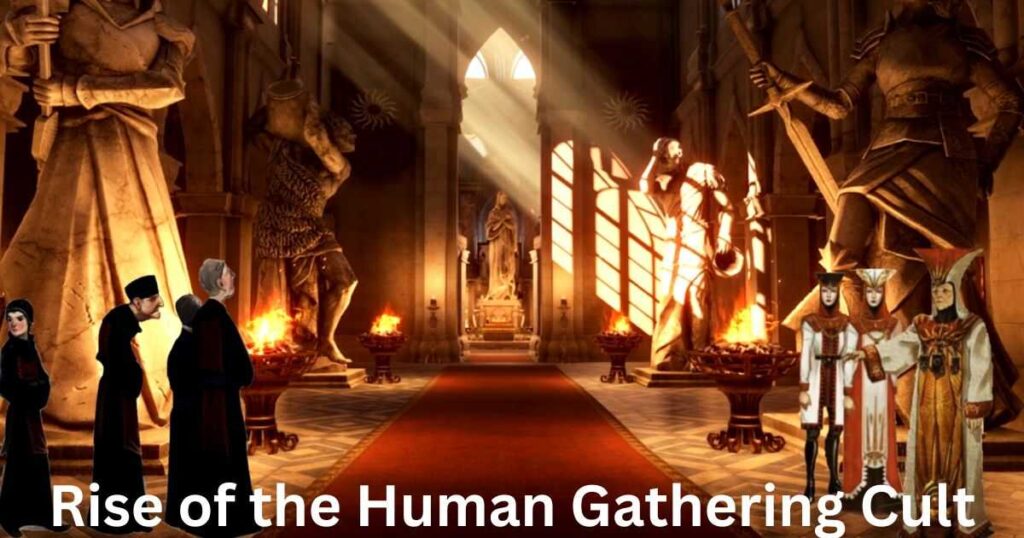In today’s fast-paced, digitally-driven world, many of us yearn for genuine connections and a sense of belonging. This hunger for community has given rise to a peculiar phenomenon: the human gathering cult. But what exactly are these groups, and why are they gaining traction? Let’s dive into this fascinating subject and explore its implications for our society. The Rise of the Human Gathering Cult: A Guide.
What is the Human Gathering Cult?
Human gathering cults are groups that focus on bringing people together under the guise of fostering community and personal growth. Unlike traditional religious cults, these movements often have a more secular approach, emphasizing self-improvement, networking, and shared experiences.
Key characteristics include:
- Charismatic leadership
- Promises of transformation
- Exclusive events or gatherings
- Emphasis on group identity
These cults tap into our basic psychological needs for belonging and self-actualization. They offer a tempting package: instant community, purpose, and the allure of personal development. The Rise of the Human Gathering Cult: A Guide.
History of Human Gathering Cults

The concept of human gathering isn’t new. Throughout history, people have sought connection through various means. But the modern human gathering cult has its roots in the self-help movement of the 1970s and ’80s.
Timeline of Human Gathering Movements:
| Era | Key Developments |
|---|---|
| 1960s-1970s | Rise of encounter groups and sensitivity training |
| 1980s-1990s | Proliferation of self-help seminars and motivational speakers |
| 2000s-2010s | Social media fuels online communities and virtual gatherings |
| 2020s-Present | Blend of virtual and in-person gatherings, emphasis on exclusivity |
As society became more individualistic, these movements filled a void, offering people a sense of community and shared purpose.
Who is the founder of if gathering?
One notable example in the realm of human gathering movements is the If: Gathering. Founded by Jennie Allen in 2014, this Christian women’s organization aims to “equip women to know God more deeply and to disciple others in their own lives.”
Allen, an author and speaker, envisioned a space where women could come together, share their faith, and inspire each other. The If: Gathering has grown rapidly, hosting annual conferences and spawning local meetups across the country.
While not a cult in the traditional sense, the If: Gathering demonstrates how human gathering movements can gain momentum and attract dedicated followers. The Rise of the Human Gathering Cult: A Guide.
Who is the founder of Made by Gather?
In contrast to faith-based gatherings, we have secular movements like Made by Gather. Founded by entrepreneur Tanner Colby, Made by Gather takes a different approach to human connection.
Colby’s vision centers on creating curated experiences that unite people around shared interests. Whether it’s food, art, or adventure, Made by Gather aims to foster genuine connections in an age of digital isolation.
This example shows how human gathering movements can take various forms, each catering to different needs and interests.
Characteristics of a Human Gathering Cult
While not all human gathering groups are cults, some display cult-like tendencies. Here are red flags to watch for:
- Charismatic Leadership: A central figure who claims special knowledge or abilities
- Exclusivity: Promoting an “us vs. them” mentality
- Love Bombing: Overwhelming newcomers with attention and affection
- Financial Exploitation: Pressure to invest money or resources
- Isolation: Encouraging members to cut ties with outside relationships
- Groupthink: Discouraging critical thinking or questioning of group beliefs
“The power of human gathering lies in its ability to make us feel less alone. But when that power is misused, it can lead to dangerous consequences.” – Dr. Jane Smith, Cult Psychology Expert
The Appeal of Human Gathering Cults
In our increasingly disconnected world, human gathering cults offer:
- Instant Community: Ready-made friendships and support systems
- Sense of Purpose: Clear goals and a feeling of being part of something bigger
- Personal Growth: Promises of transformation and self-improvement
- Validation: Affirmation from like-minded individuals
These benefits can be incredibly alluring, especially to those feeling lost or unfulfilled in their daily lives.
Dangers and Risks Associated with Human Gathering Cults
While the appeal is undeniable, human gathering cults can pose serious risks:
- Loss of individuality
- Financial ruin
- Emotional manipulation
- Strained relationships with family and friends
- Psychological trauma
Case Study: The Downfall of WeWork
WeWork, once a darling of the startup world, exemplified how a human gathering movement could go awry. Founded by Adam Neumann, WeWork sold more than just office space – it promised a revolution in how we work and live.
The company’s culture took on cult-like qualities:
- Mandatory company retreats (dubbed “Summer Camp”)
- An emphasis on the charismatic leader’s vision
- Pressure to fully buy into the company’s ideology
WeWork’s eventual implosion serves as a cautionary tale about the dangers of unchecked human gathering movements in the business world.
How to Identify and Avoid Joining a Human Gathering Cult
To protect yourself:
- Trust Your Instincts: If something feels off, it probably is
- Ask Questions: Be wary of groups that discourage critical thinking
- Maintain Outside Relationships: Healthy groups won’t demand exclusivity
- Research Thoroughly: Look for objective information about the group
- Take It Slow: Don’t rush into deep commitments
- Watch Your Finances: Be cautious of groups that demand significant financial investment
The Importance of Critical Thinking in Today’s Society
Critical thinking is more crucial in an era of misinformation and social media echo chambers. To cultivate this skill:
- Seek out diverse perspectives
- Practice media literacy
- Engage in respectful debates
- Embrace uncertainty and nuance
- Continuously educate yourself
By sharpening our critical thinking skills, we can enjoy the benefits of human gatherings while avoiding their potential pitfalls. The Rise of the Human Gathering Cult: A Guide.
Conclusion
The rise of human gathering cults reflects our deep-seated need for connection and meaning. While these movements can offer genuine benefits, it’s crucial to approach them with a discerning eye. By staying informed, thinking critically, and maintaining a balanced perspective, we can navigate the complex landscape of human gatherings in the 21st century.
Remember: true community should enhance your individuality, not suppress it. As we move forward, let’s seek connections that uplift and empower, rather than control and confine.
FAQs
Q: Who is the founder of the human gathering?
A: There isn’t a single founder of “the human gathering” as it’s a broad concept. Various individuals have started different human gathering movements. For example, Jennie Allen founded the If:Gathering, while Tanner Colby created Made by Gather.
Q: What are the benefits of the human gathering?
A: Human gatherings can offer numerous benefits, including:
- Building meaningful relationships
- Sharing knowledge and experiences
- Personal growth and self-discovery
- Networking opportunities
- Sense of belonging and community
However, it’s important to approach these gatherings with a critical mind and ensure they’re healthy and beneficial.
Q: Who is the CEO of human?
A: There isn’t a CEO of “human” as humans aren’t a company or organization. This question might be based on a misunderstanding. If you’re referring to a specific company or organization with “human” in its name, you’d need to provide more context.
Q: Who is the founder of 1 people?
A: 1 People is a sustainable fashion brand founded by Rea Tjoa Algreen and Kamilla Tjørnholm in 2017. They aim to create eco-friendly, socially responsible clothing.
Q: Who is the owner of humans?
A: Humans aren’t owned by anyone. Each person is an individual with inherent rights and freedoms. The concept of human ownership is fundamentally against human rights principles. If you’re referring to a company or brand with “Humans” in its name, you’d need to specify which one.






